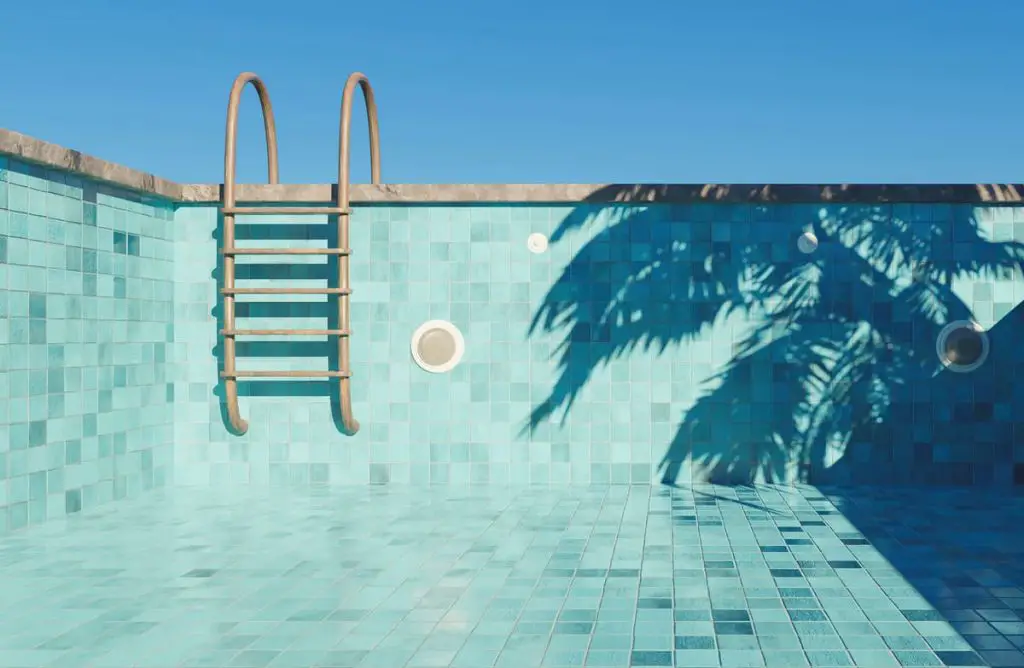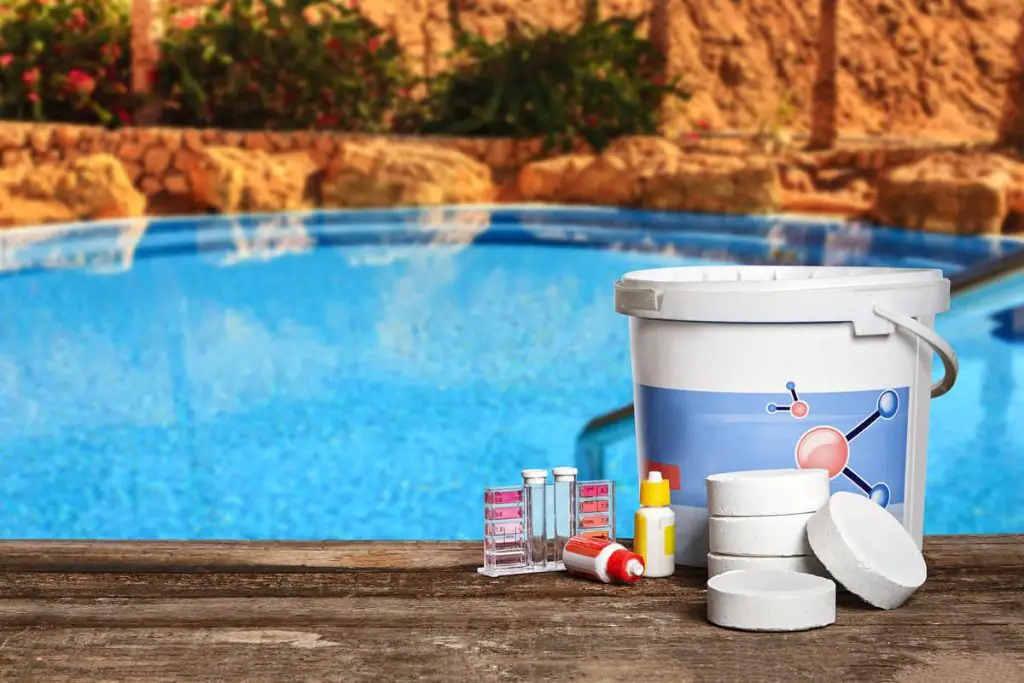We use pool chemicals for disinfecting pool water and maintaining healthy water chemistry. Given their effectiveness, it’s reasonable to wonder if they can damage other things, like the pools components or storage areas. Do they cause rust?
Pool chemicals do cause rust. Chlorine, the most commonly used pool chemical, forms corrosive acids when mixed with water, which can cause rust if allowed to contact susceptible surfaces. However, it doesn’t cause rust without first reacting with water or other chemicals.
As a pool owner, you would be wise to understand how chlorine reacts with water to create corrosive substances, and the importance of proper storage to avoid hazardous and expensive issues!

How Pool Chemicals Cause Rust
Chlorine, the most frequently used pool cleaning chemical, is generally harmless in its packaged form. This chemical destroys organisms like bacteria and algae, keeping the pool clean by leaving it uninhabitable.
However, mixing it with water triggers reactions that create hydrochloric and hypochlorous acids. These acids can corrode and oxidize surfaces, making chlorine potentially very destructive if used or stored incorrectly.
Among the things that can be corroded by chlorine are metals, resulting in the formation of rust. Any metal that typically rusts will undergo corrosion from prolonged contact with activated chlorine.
Even metals that don’t rust, such as aluminum, are still susceptible to corrosion from chlorine. In these cases, the corrosion will show up as a white or gray color rather than the recognizable red and brown hues of rust.
Fortunately, this isn’t a fast-acting process and shouldn’t be a problem unless you leave activated or degraded chlorine near vulnerable surfaces. Since your pool is likely not made of rustable metal, it’ll be fine.
How to Store Pool Chemicals Safely
Since pools are designed for water and cleaners, you generally don’t have to worry about them corroding from chlorine in the water. Most pools use materials that don’t easily break down and can’t rust, so chlorine is safe to use.
Instead, focus on where you’re storing pool chemicals and what you’re putting in your pool. The pool itself is likely resistant to chlorine’s corrosive effects, but that doesn’t mean your pool cleaning supplies and tool shed are safe.
Proper storage is essential if you want to keep your pool chemicals from degrading or creating rust. Here are some helpful tips:
- Don’t store them outside. Direct sunlight is unhealthy for chemicals like chlorine, and exposure to moisture will activate it.
- Seek out a cool and dry environment for storage. A shed or garage can suffice, but take care to ensure the environment is optimal. Keep chemicals away from sensitive surfaces so that you don’t end up with rust everywhere.
- Store chlorine and similar chemicals in a sealed container or package. You won’t have to worry about it leaking out or interacting with the environment.
Can You Mix Pool Chemicals?
While some professionals intentionally mix chlorinated water and ammonia to clean swimming pools, it is best to never mix your pool chemicals. The wrong mixture can release toxic gas that can be harmful to humans, animals, and the environment.
Another way your pool chemicals can corrode and rust their surroundings is by creating chlorine gas.
Chlorine in its solid and liquid forms is generally safe and easy to manage. When diluted correctly, it makes water uninhabitable to most organisms while keeping it safe for people and other large animals. However, when mixed with other chemicals, particularly ammonia, it can create a corrosive and deadly gas.
Chloramine, also known as chlorine gas and sometimes compared to mustard gas for its effects, is the primary product of mixing chlorine and ammonia. This gas forms when the two chemicals combine and react.
Outdoor pools are unlikely to create enough chlorine gas to cause any long-term severe problems since the solution is significantly diluted. However, if chlorine gas is made indoors, it can fill a room, creating a toxic environment and causing rust and corrosion to anything within.
In addition, make sure to store them properly and avoid direct contact between chemicals to prevent any accidental mixing.

How Chemicals Keep Pools Clean
Chlorine works by creating mild, diluted acids in the water. This kills tiny organisms like bacteria and algae and makes the environment less hospitable to other creatures, such as insects, that might want to live there.
Since these creatures are small and often very sensitive to changes in their environment, it’s easy to kill them with only a slight amount of chlorine.
Other pool chemicals, such as bromine fulfill a similar purpose. However, chlorine is still the preferred option due to its efficiency and cheaper cost.
Even when other chemicals are used, chlorine is often used in conjunction with them for its benefits. Other pool-cleaning chemicals like bromine are safe to mix with chlorine, so the practice is prevalent.
Are Pool Chemicals Harmful?
Despite how effective chlorine and other chemicals render water uninhabitable to small creatures, they’re still in the water we swim in and drink. This is because, when used properly, these chemicals are relatively safe for us.
Generally safe chemicals like chlorine can be toxic to people in extremely high amounts, and it’s possible to create deadly gas if the wrong chemicals are mixed. That is why it’s essential to properly store your pool chemicals and measure how much of them you’re using.
Aside from leaving a bit of a signature smell and aftertaste, small amounts of chlorine are harmless. When properly diluted, the acidic solutions created by chlorine won’t impact humans. This is why we use chlorine to disinfect drinking water.
Exercise caution when dealing with any chemicals, and pool chemicals are no exception. For more information on pool chemicals check out The Beginner’s Guide to Pool Water Chemistry.
Always use personal protective equipment (PPE) when handling chemicals.
Conclusion
Pool chemicals are generally safe and non-destructive when appropriately used. However, there are some things to keep in mind:
- Pool chemicals cause rust when activated with water.
- Combining chlorine with other chemicals can create a corrosive and toxic gas. Do your research before using or mixing any chemicals you’re unfamiliar with.
Sources
- Live Science: How Did a Chlorine Gas Cloud Form Over a Public Pool?
- Chemical Safety Facts: How Chlorine Keeps Pools Safe for Summertime Fun
- Chlorine Institute: Other Hazards
- National Library of Medicine: Chlorine Gas Toxicity
- EPA: Chemical Safety Alert: Safe Storage and Handling of Swimming Pool Chemicals
